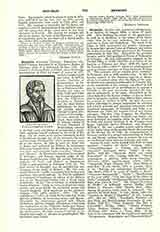

Reumont, ALFRED VON, statesman and historian, b. at Aachen, August 15, 1808; d. there, April 27, 1887. After finishing his course at the gymnasium, he took up in obedience to the wishes of his father rather than to his own inclination, the study of medicine at Bonn and Heidelberg. The death of his father in 1828 interrupted his studies, whereupon he became first private tutor at Florence, and within the course of a year, private secretary of the Prussian ambassador in that city. Meanwhile he attended lectures, and in 1833 graduated Doctor of Philosophy at Erlangen. He was subsequently engaged in the Foreign Office at Berlin (1835-6), as secretary of the legation at Florence and Rome (1836-43), again in the Foreign Office (1843-7), where he simultaneously acted as private secretary to King Frederick William IV. This monarch always reposed great confidence in Reumont, and in 1846 ennobled him. In 1847 he became counsel of the Prussian legation at Rome, where he remained alone after the flight of the pope. In 1851 he was appointed ambassador to Tuscany, but, on the annexation of this country, was placed on half pay, in consequence of an unwillingness to appoint a Catholic to the post previously intended for him: that of ambassador to the pope… Henceforth he devoted himself to his literary studies—at first in Rome, then in his native Aachen, from 1868 in Bonn, whence he returned to Aachen in 1878. In spite of severe bodily sufferings he always maintained his relations and a lively personal and epistolary intercourse with prominent personages of Germany and Italy, e.g. Hermann von Thile, his intimate friend and former colleague, Marchese Gino Capponi, the illustrious literary historian of Italy, Leopold von Ranke, the great historical investigator whom he had attacked in 1830, and several members of the Prussian royal house, especially Queen Elizabeth and Emperor William I. He was a prolific author, and in almost all his works takes as his special theme the portrayal of the literary life of Italy, the communication to German readers of a deeper understanding of Italian art and history, seeking thus to prepare the way for an intellectual union between Germany and Italy.
Among his many works dealing with Italy we must mention: “Andrea del Sarto” (Leipzig, 1835); “Reiseschilderungen u. Umrisse aus sadlichen Gegenden” (Stuttgart, 1835); “Italia” (2 vols. Berlin, 1838-40); “Romische Briefe von einem Florentiner” (4 vols. Leipzig, 184044); “Tavole cronologiche e sincrone della storia fiorentina” (Florence, 1841), supplementary volume (1875); “Ganganelli, Papst Clemens XIV. Seine Briefe u. seine Zeit” (2 vols, Berlin, 1851; tr. London, 1854). In his “Beitrage zur italienischen Geschichte” (6 vols., Berlin, 1853-7) he treats of “Galilei u. Rom”, “Francesco Burlemacchi”, “Gaeta”, “Recollections of the year 1849”, “The last days of the Order of Malta“, and finally “The Queen of Etruria’s attempted flight from Nizza in 1811”. His “Jugend Katerinas de Medici” is brilliantly written (Berlin, 1854; Italian tr. Florence, 1858; French, Paris, 1864). Among his greatest works must be reckoned: “Geschichte der Stadt Rom” (3 vols. Berlin, 1867-70); “Lorenzo de Medici it Magnifico” (2 vols. Leipzig, 1874; 2nd ed., 1883); “Geschichte Toscanas seit dem Ende des florentinischen Freistaates (2 vols. Gotha, 1867-77); “Gino Gino Capponi. Ein Zeit u. Lebensbild” (Gotha, 1880); “Vittoria Colonna. Leben, Dichten, Glauben im 16. Jahrhundert” (Freiburg, 1881; Italian tr., Turin, 1883). As the fruit of his connections with the royal house appeared: “Zeitgenossen. Biographien and Characteristiken” (Berlin, 1862), of which the second volume is devoted to Frederick William IV; “Biographische Denkblatter nach personlichen Erinnerungen” (Leipzig, 1878); “Aus Konig Friedrich Wilhelms IV. gesunden u. kranken Tagen” (Leipzig, 1885). To his Rhenish homeland were devoted the “Aachener Liederchronik” (Aachen, 1873) and “Die rheinische Flora” (Aachen, 1881).
PATRICIUS SCHLAGER

